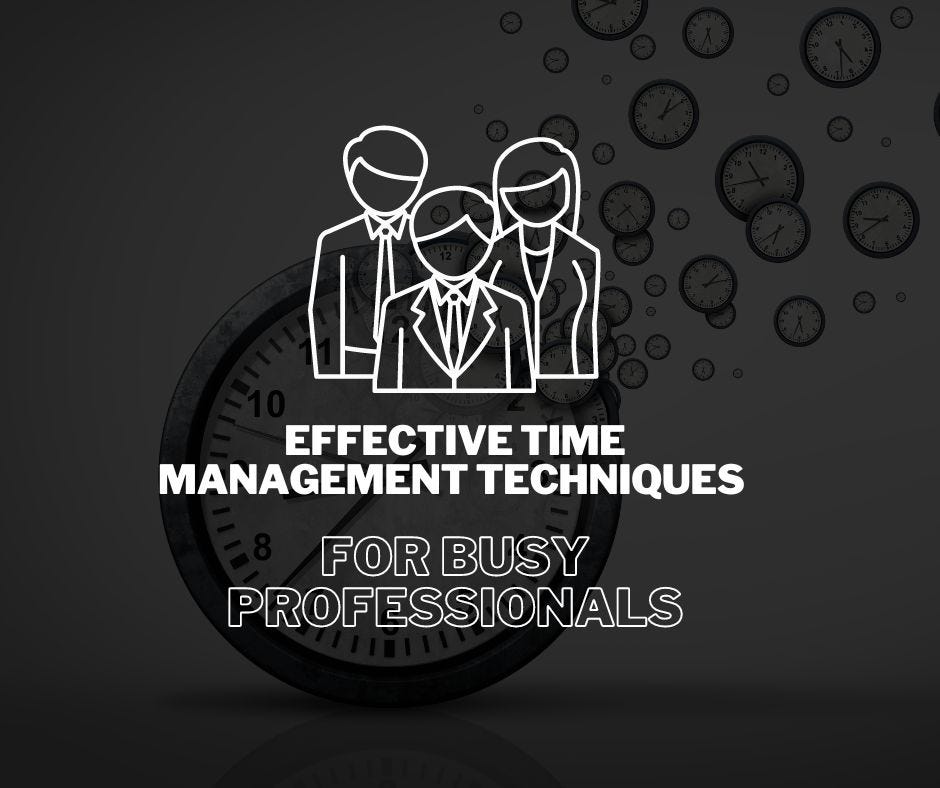As a busy professional, you probably find yourself constantly juggling multiple tasks and struggling to find enough hours in the day to get everything done. I know exactly how you feel, as I have experienced the same challenges throughout my career. However, over the years, I have discovered a few time management techniques that have helped me stay organized, reduce stress, and increase my productivity. In this blog post, I will share these techniques with you, in the hope that they can also have a positive impact on your professional life.
One of the most effective time management techniques I have found is prioritizing tasks. This involves taking a few minutes each morning (or the night before) to make a to-do list for the day. Start by identifying the most important and urgent tasks and place them at the top of the list. This way, you ensure that you complete the tasks that require immediate attention and avoid wasting time on less important activities. Prioritizing tasks helps you stay focused and ensures that you make progress on the most critical projects.
Another technique that has worked wonders for me is using a calendar or planner. Having a visual representation of your schedule helps you plan your days, weeks, and even months more effectively. Block out specific times for different tasks, meetings, and deadlines. Remember to schedule breaks and downtime to avoid burnout. By having a clear plan, you will be less likely to waste time, and you’ll have a greater sense of control over your workload.
Alongside a calendar, I highly recommend utilizing technology to boost your time management skills. There are numerous productivity apps available that can help you stay organized and focused. For instance, project management tools like Trello or Asana allow you to create task boards, assign deadlines, and collaborate with colleagues. Additionally, time tracking apps such as Toggl or RescueTime help you understand where your time is going and identify areas for improvement. Experiment with different apps and find the ones that align with your needs and preferences.
While it may seem counterintuitive, taking breaks is essential for maintaining productivity throughout the day. As busy professionals, we often believe that we must work non-stop to get everything done. However, research has shown that taking regular breaks can actually increase focus and overall productivity. For instance, the Pomodoro Technique suggests working in focused sprints of 25 minutes, followed by a 5-minute break. After four consecutive work sprints, take a more extended break of around 15-30 minutes. This technique allows you to work at your best while preventing burnout.
As important as it is to manage your time efficiently, it’s equally crucial to manage your energy levels. Pay attention to your physical and mental wellbeing. Make sure to prioritize a good night’s sleep, eat nutritious meals, and get regular exercise. When you feel energized and healthy, you’ll experience increased focus and productivity during your work hours. Taking care of your well-being is not a luxury; it’s a crucial investment in your long-term professional success.
Delegate and outsource as much as you can. Many times, as professionals, we fall into the trap of thinking that we must do everything ourselves. However, learning to delegate tasks to competent colleagues or outsourcing certain activities can be a game-changer. Identify tasks that don’t necessarily require your expertise or that can be done by others. Distribute the workload, trusting in the capabilities of your team members or considering hiring freelancers for specific tasks. By doing so, you free up time to focus on high-priority projects and maintain a healthier work-life balance.
Lastly, learn to say no. As professionals, we often feel obligated to say yes to every request or opportunity that comes our way. However, this can lead to spreading ourselves too thin and becoming overwhelmed. Understand your limits and recognize that it’s okay to decline certain commitments if they don’t align with your priorities or if you genuinely don’t have the capacity to take them on. Saying no is not a sign of weakness; it’s a way to protect your time and ensure that you can dedicate it to what truly matters to you.
In conclusion, time management is a crucial skill for busy professionals. Prioritizing tasks, using a calendar or planner, leveraging technology, taking breaks, managing energy levels, delegating and outsourcing, and learning to say no are all strategies that can help you make the most of your time. Experiment with these techniques and find the ones that work best for you. Remember, time management is a continuous learning process, so be patient with yourself and stay committed to improving your productivity and overall work-life balance.
